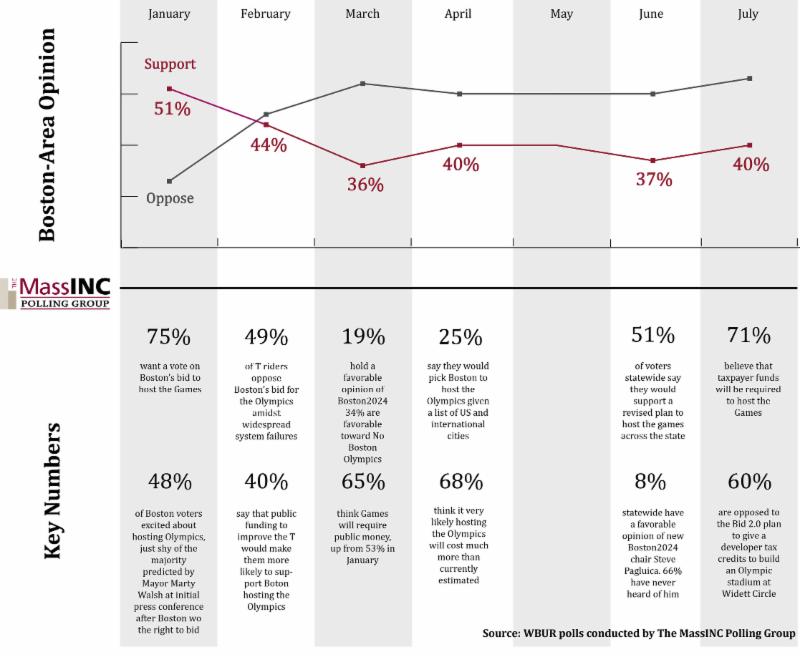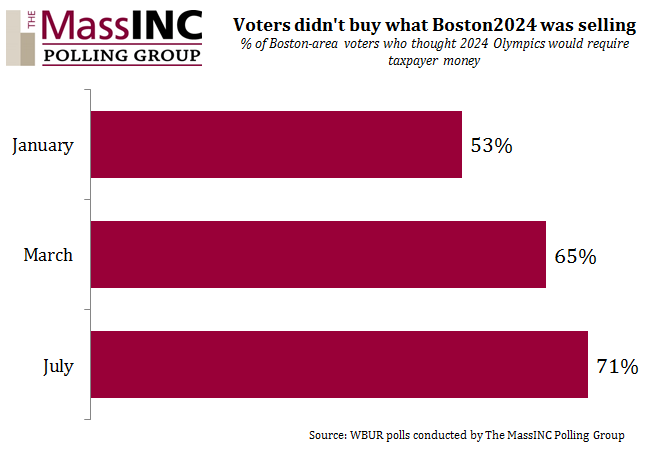The Topline, Special Edition: You Killed the Bid
You, the voters of Massachusetts, killed the Boston Olympic bid. You were the problem for Boston 2024 from the beginning. Political figures and opposition groups will surely claim and receive a measure of credit. But it was the public, persistently and consistently expressing skepticism through public opinion polls, on social media, and at community meetings that did in the bid.
The US Olympic Committee's statements upon pulling the bid made this clear. "Notwithstanding the promise of the original vision for the bid, and the soundness of the plan developed under Steve Pagliuca, we have not been able to get a majority of the citizens of Boston to support hosting the 2024 Olympic and Paralympic Games," USOC CEO Scott Blackmun told the Boston Globe. "Therefore, the USOC does not think that the level of support enjoyed by Boston's bid would allow it to prevail over great bids from Paris, Rome, Hamburg, Budapest, or Toronto."
 Public polling, at its most basic, is a way for citizens to speak to their leaders and to one another. Poll results include those who don't put their opinions on Twitter and those who may not take the time to call their legislators or show up at a community meeting. And here, voters used their voices to tell the powers-that-would-be that they weren't buying what Boston 2024 was selling. In a time when most parts of the political process are heavily weighted toward wealthy donors, Boston 2024 died at the doorstep of the everyday voter.
Public polling, at its most basic, is a way for citizens to speak to their leaders and to one another. Poll results include those who don't put their opinions on Twitter and those who may not take the time to call their legislators or show up at a community meeting. And here, voters used their voices to tell the powers-that-would-be that they weren't buying what Boston 2024 was selling. In a time when most parts of the political process are heavily weighted toward wealthy donors, Boston 2024 died at the doorstep of the everyday voter.
The USOC set various goals for public opinion and when they weren't met, pulled the plug. The final straw may have been the reticence of Mayor Walsh and Governor Baker expressed over the last week. But make no mistake: if public support had been around 80 percent, leaders at all levels would likely be racing one another to the nearest podium to express any necessary measure of support for the Games.
Snow buries Bid 1.0
Instead, our six polls since January for WBUR showed support for the bid stuck in the 30s and 40s. In nearly every case since January, opponents outnumbered supporters. February's massive snowfall, and the catastrophic failure of the MBTA to cope with it, threw a chill over Boston 2024 that showed little signs of melting well into summer. The T seems to have been decisive in stopping any early momentum in its tracks. Starting in February, T riders were consistently less enthusiastic than non-riders about the prospect of hosting the games.
The T could also have presented an opportunity for Boston 2024 to make its case for an Olympic legacy. Forty percent of Boston-area voters said that improvements to the aging transit system would have made them more likely to support hosting the games. But Boston 2024, boxed in by their claims that all the transportation projects needed for the games were already in the pipeline, was unable to convince the public that the Olympics would deliver significant transit benefits that would otherwise be missed.
The public funding question
Instead, the debate fell into an endless and largely inscrutable back and forth over who would pay for what and how much it would cost. Taxpayers fear that they would end up on the hook for overruns was significantly responsible for low public support. An April Suffolk poll showed a majority would support a privately-funded games. But the time spent to convince the public that they wouldn't end up with the bill proved fruitless and even counterproductive.
Not only did the focus on the bottom line and cost overruns limit any discussion of legacy improvements, it just plain didn't work. In fact, the more Boston 2024 talked about its privately financed vision, the less people believed it. In January, 53 percent thought that public funding would be required to host the games. In March, that figure had climbed to 65 percent. By July, seven in ten in the Boston area thought the public would be on the hook. Unilateral disarming
Unilateral disarming
Boston 2024's seemingly ineffective communications efforts came at a heavy price, both in terms of consultant and executive salaries and political blowback. Voters in our March poll were split evenly as to whether they approved or disapprove of former Governor Deval Patrick's paid role as an ambassador for Boston 2024. The handling of compensation issues, along with the reluctance to release the original Bid 1.0 in its entirety, cut into Boston 2024's favorables, which were underwater from March onwards and finished at 26 percent in July. Boston 2024 expressly took off the table the idea of paid advertising at the critical moment, essentially locking in their low ratings.
With little effort in terms of communications to support it, Bid 2.0 landed like a tree in a distant forest. Most said they were paying little attention to it; three-fifths said its details would make no difference to their opinion on the bid. And while the idea of spreading out Olympic venues across the state had bare majority support, more were opposed to a key feature of the new plan: giving massive tax breaks to a developer to build a temporary Olympic stadium and related infrastructure at Widett Circle.
Still, going into last week's TV debate between Boston 2024 and No Boston Olympics, around half of the public was undecided or open to changing their mind-plenty for Boston 2024 to put together a majority. But the debate focused on the mundane details of the issue the public feared most: public funding. With no strategy to change the subject, and no prospects of a strong campaign, it is difficult to see how Boston 2024 could have put out what had become a stinky, smoldering dumpster fire of discontent and distrust.
Though the office chairs are still warm at Boston 2024, talk has already moved to the USOC's aim of resurrecting the Los Angeles bid for 2024. Most Americans hope they succeed. Nationally, 89 percent of Americans want to see the U.S. host the Olympics again. That figure drops nearly 30 points when residents are asked about their own area hosting the games. Still, that support level would have kept Boston in the running. Instead, the Olympics dream is over, and Boston-area voters need look no further than the bathroom mirror for whom to thank or blame.
